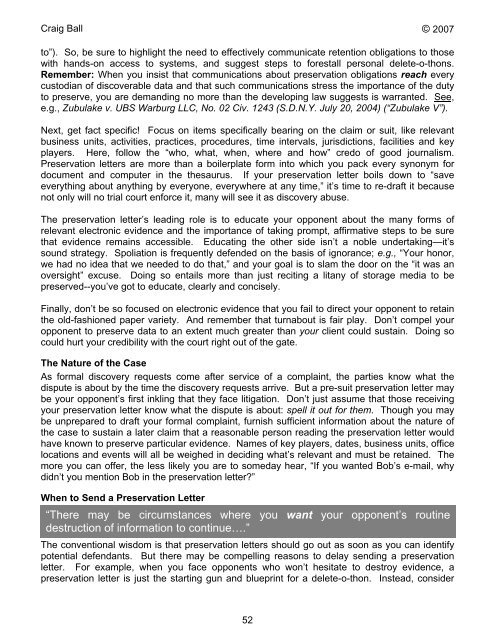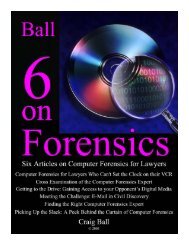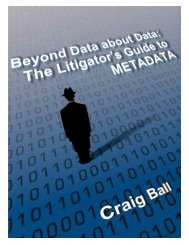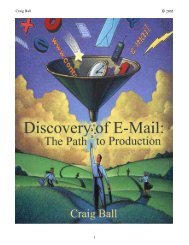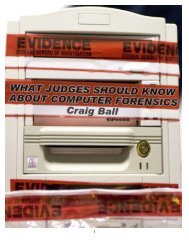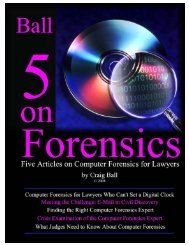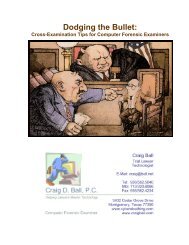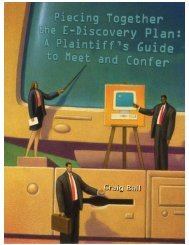Six Articles on Electronic - Craig Ball
Six Articles on Electronic - Craig Ball
Six Articles on Electronic - Craig Ball
You also want an ePaper? Increase the reach of your titles
YUMPU automatically turns print PDFs into web optimized ePapers that Google loves.
<strong>Craig</strong> <strong>Ball</strong> © 2007<br />
to”). So, be sure to highlight the need to effectively communicate retenti<strong>on</strong> obligati<strong>on</strong>s to those<br />
with hands-<strong>on</strong> access to systems, and suggest steps to forestall pers<strong>on</strong>al delete-o-th<strong>on</strong>s.<br />
Remember: When you insist that communicati<strong>on</strong>s about preservati<strong>on</strong> obligati<strong>on</strong>s reach every<br />
custodian of discoverable data and that such communicati<strong>on</strong>s stress the importance of the duty<br />
to preserve, you are demanding no more than the developing law suggests is warranted. See,<br />
e.g., Zubulake v. UBS Warburg LLC, No. 02 Civ. 1243 (S.D.N.Y. July 20, 2004) (“Zubulake V”).<br />
Next, get fact specific! Focus <strong>on</strong> items specifically bearing <strong>on</strong> the claim or suit, like relevant<br />
business units, activities, practices, procedures, time intervals, jurisdicti<strong>on</strong>s, facilities and key<br />
players. Here, follow the “who, what, when, where and how” credo of good journalism.<br />
Preservati<strong>on</strong> letters are more than a boilerplate form into which you pack every syn<strong>on</strong>ym for<br />
document and computer in the thesaurus. If your preservati<strong>on</strong> letter boils down to “save<br />
everything about anything by every<strong>on</strong>e, everywhere at any time,” it’s time to re-draft it because<br />
not <strong>on</strong>ly will no trial court enforce it, many will see it as discovery abuse.<br />
The preservati<strong>on</strong> letter’s leading role is to educate your opp<strong>on</strong>ent about the many forms of<br />
relevant electr<strong>on</strong>ic evidence and the importance of taking prompt, affirmative steps to be sure<br />
that evidence remains accessible. Educating the other side isn’t a noble undertaking—it’s<br />
sound strategy. Spoliati<strong>on</strong> is frequently defended <strong>on</strong> the basis of ignorance; e.g., “Your h<strong>on</strong>or,<br />
we had no idea that we needed to do that,” and your goal is to slam the door <strong>on</strong> the “it was an<br />
oversight” excuse. Doing so entails more than just reciting a litany of storage media to be<br />
preserved--you’ve got to educate, clearly and c<strong>on</strong>cisely.<br />
Finally, d<strong>on</strong>’t be so focused <strong>on</strong> electr<strong>on</strong>ic evidence that you fail to direct your opp<strong>on</strong>ent to retain<br />
the old-fashi<strong>on</strong>ed paper variety. And remember that turnabout is fair play. D<strong>on</strong>’t compel your<br />
opp<strong>on</strong>ent to preserve data to an extent much greater than your client could sustain. Doing so<br />
could hurt your credibility with the court right out of the gate.<br />
The Nature of the Case<br />
As formal discovery requests come after service of a complaint, the parties know what the<br />
dispute is about by the time the discovery requests arrive. But a pre-suit preservati<strong>on</strong> letter may<br />
be your opp<strong>on</strong>ent’s first inkling that they face litigati<strong>on</strong>. D<strong>on</strong>’t just assume that those receiving<br />
your preservati<strong>on</strong> letter know what the dispute is about: spell it out for them. Though you may<br />
be unprepared to draft your formal complaint, furnish sufficient informati<strong>on</strong> about the nature of<br />
the case to sustain a later claim that a reas<strong>on</strong>able pers<strong>on</strong> reading the preservati<strong>on</strong> letter would<br />
have known to preserve particular evidence. Names of key players, dates, business units, office<br />
locati<strong>on</strong>s and events will all be weighed in deciding what’s relevant and must be retained. The<br />
more you can offer, the less likely you are to someday hear, “If you wanted Bob’s e-mail, why<br />
didn’t you menti<strong>on</strong> Bob in the preservati<strong>on</strong> letter?”<br />
When to Send a Preservati<strong>on</strong> Letter<br />
“There may be circumstances where you want your opp<strong>on</strong>ent’s routine<br />
destructi<strong>on</strong> of informati<strong>on</strong> to c<strong>on</strong>tinue….”<br />
The c<strong>on</strong>venti<strong>on</strong>al wisdom is that preservati<strong>on</strong> letters should go out as so<strong>on</strong> as you can identify<br />
potential defendants. But there may be compelling reas<strong>on</strong>s to delay sending a preservati<strong>on</strong><br />
letter. For example, when you face opp<strong>on</strong>ents who w<strong>on</strong>’t hesitate to destroy evidence, a<br />
preservati<strong>on</strong> letter is just the starting gun and blueprint for a delete-o-th<strong>on</strong>. Instead, c<strong>on</strong>sider<br />
52


